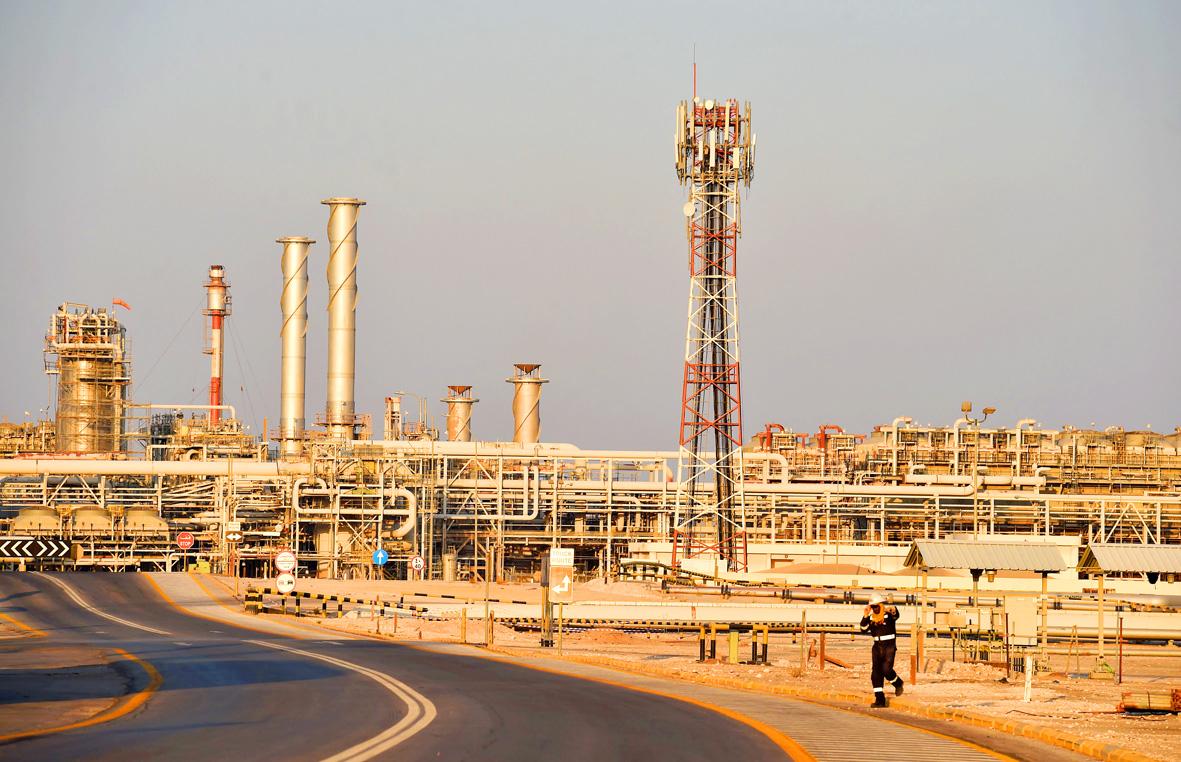Oil yesterday slumped to a 17-year low as coronavirus lockdowns cascaded through the world’s largest economies, leaving the market overwhelmed by cratering demand and a ballooning surplus of crude.
Futures in London fell as much as 7.6 percent to the lowest since November 2002, while New York crude briefly dipped below US$20 a barrel.
Physical oil markets are struggling to store fuel, hit by a double whammy of virus restrictions eroding demand and a damaging war for market share between Saudi Arabia and Russia that has prices on track for the worst quarter on record.

Photo: AFP
“Demand concerns are critical but well known, what really took the market down were the signals we got from Saudi Arabia and Russia that they intend to continue their current path,” said Vivek Dhar, a commodities analyst at Commonwealth Bank of Australia in Sydney. “Market hopes of a deal have come undone.”
OPEC nations are not giving support to a request from the group’s president for emergency consultations over tanking prices, according to a delegate.
Algeria, which holds the cartel’s rotating presidency, has urged the secretariat to convene a pane, but the call has failed to gather the majority backing necessary to go ahead. Riyadh is among those opposing the idea.
The world normally uses 100 million barrels of oil per day, but forecasters predict as much as a quarter of that has disappeared in just a few weeks.
The plunge in consumption is without precedent since a steady flow of oil became essential to the global economy more than a century ago.
Brent crude for May declined US$1.45, or 5.8 percent, to US$23.48 a barrel on the ICE Futures Europe exchange as of 7:21am in London after falling to US$23.03 earlier.
The contract is also set for the worst month on record, down about 54 percent this month, and 64 percent lower this quarter.
West Texas Intermediate slid US$0.82, or 3.8 percent, to US$20.69 a barrel on the New York Mercantile Exchange after falling to US$19.92 in early trading.
The contract is down 54 percent this month and about 66 percent this quarter.
Global oil demand is in freefall and consumption might decline by as much as 20 million barrels a day, the International Energy Administration said.
That is forcing producers worldwide to slash output. Trafigura Group expects as much as 1 billion barrels to be sent into storage tanks in the coming months.

Taiwan Transport and Storage Corp (TTS, 台灣通運倉儲) yesterday unveiled its first electric tractor unit — manufactured by Volvo Trucks — in a ceremony in Taipei, and said the unit would soon be used to transport cement produced by Taiwan Cement Corp (TCC, 台灣水泥). Both TTS and TCC belong to TCC International Holdings Ltd (台泥國際集團). With the electric tractor unit, the Taipei-based cement firm would become the first in Taiwan to use electric vehicles to transport construction materials. TTS chairman Koo Kung-yi (辜公怡), Volvo Trucks vice president of sales and marketing Johan Selven, TCC president Roman Cheng (程耀輝) and Taikoo Motors Group

Among the rows of vibrators, rubber torsos and leather harnesses at a Chinese sex toys exhibition in Shanghai this weekend, the beginnings of an artificial intelligence (AI)-driven shift in the industry quietly pulsed. China manufactures about 70 percent of the world’s sex toys, most of it the “hardware” on display at the fair — whether that be technicolor tentacled dildos or hyper-realistic personalized silicone dolls. Yet smart toys have been rising in popularity for some time. Many major European and US brands already offer tech-enhanced products that can enable long-distance love, monitor well-being and even bring people one step closer to

RECORD-BREAKING: TSMC’s net profit last quarter beat market expectations by expanding 8.9% and it was the best first-quarter profit in the chipmaker’s history Taiwan Semiconductor Manufacturing Co (TSMC, 台積電), which counts Nvidia Corp as a key customer, yesterday said that artificial intelligence (AI) server chip revenue is set to more than double this year from last year amid rising demand. The chipmaker expects the growth momentum to continue in the next five years with an annual compound growth rate of 50 percent, TSMC chief executive officer C.C. Wei (魏哲家) told investors yesterday. By 2028, AI chips’ contribution to revenue would climb to about 20 percent from a percentage in the low teens, Wei said. “Almost all the AI innovators are working with TSMC to address the

Malaysia’s leader yesterday announced plans to build a massive semiconductor design park, aiming to boost the Southeast Asian nation’s role in the global chip industry. A prominent player in the semiconductor industry for decades, Malaysia accounts for an estimated 13 percent of global back-end manufacturing, according to German tech giant Bosch. Now it wants to go beyond production and emerge as a chip design powerhouse too, Malaysian Prime Minister Anwar Ibrahim said. “I am pleased to announce the largest IC (integrated circuit) Design Park in Southeast Asia, that will house world-class anchor tenants and collaborate with global companies such as Arm [Holdings PLC],”